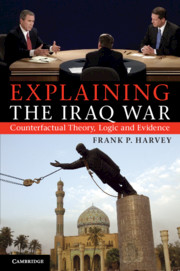Book contents
- Frontmatter
- Contents
- Figures
- Tables
- Acknowledgments
- Introduction
- 1 Comparative counterfactual analysis and the 2003 Iraq war
- 2 Leadership, political context(s) and the Iraq war
- 3 Democratic national security advisers
- 4 Domestic and congressional politics
- 5 American intelligence failures and miscalculations
- 6 Societal pressures and public opinion
- 7 International politics, global WMD consensus and UN power balancing
- 8 Hussein’s mistakes, miscalculations and misperceptions
- 9 Summary and implications
- 10 Conclusion
- Bibliography
- Index
Introduction
Published online by Cambridge University Press: 05 June 2012
- Frontmatter
- Contents
- Figures
- Tables
- Acknowledgments
- Introduction
- 1 Comparative counterfactual analysis and the 2003 Iraq war
- 2 Leadership, political context(s) and the Iraq war
- 3 Democratic national security advisers
- 4 Domestic and congressional politics
- 5 American intelligence failures and miscalculations
- 6 Societal pressures and public opinion
- 7 International politics, global WMD consensus and UN power balancing
- 8 Hussein’s mistakes, miscalculations and misperceptions
- 9 Summary and implications
- 10 Conclusion
- Bibliography
- Index
Summary
The generally accepted historical account of the 2003 Iraq war is very clear – this was a war of choice, not one of necessity. The decision to attack Saddam Hussein’s regime on March 19, 2003 was a product of the political biases, misguided priorities, intentional deceptions and grand strategies of President George W. Bush and prominent ‘neoconservatives,’ ‘unilateralists’ and ‘Vulcans’ on his national security team. A few powerful ideologues exploited public fears (and international goodwill) in the aftermath of 9/11 to amplify Iraq’s weapons of mass destruction (WMD) threat as a primary justification for an unnecessary, preventive invasion. Disarming and democratizing Saddam’s brutal regime were viewed as moral imperatives and considered essential to the long-term security interests of the United States. These imperatives, in turn, explain why the 2002 National Intelligence Estimate on Iraq was updated to exaggerate the scope of Baghdad’s WMD–terrorism nexus. To fully appreciate the causal path leading to the onset of military hostilities in 2003, therefore, we need to understand George W. Bush the person, the powerful and determined neocons and unilateralists who advised him, and the package of prejudices, emotions, beliefs and values shared by those responsible for crafting the Bush Doctrine. In essence, neoconservatives, backed by other senior members of the Bush administration, abused their control of the White House to push the country into a war of choice that would otherwise never have happened – never!
The ‘Bush-neocon-war’ thesis, which I will label neoconism, has emerged as the dominant narrative used to explain the US attack, essentially confirming Robert Kagan’s (2008a) prediction that it would become the generally approved story in history books. It represents the prevailing consensus, theory or hypothesis running through dozens of the most popular books on the Bush administration, and hundreds of frequently cited (and widely circulated) scholarly articles, media reports and blog entries on the Iraq war. There is of course some variation in the literature regarding the administration’s underlying motivations, but the different ‘goals’ authors identify as central to the invasion (e.g., control over oil, democratization of the Middle East, eliminating Iraq’s WMD threat and links to terrorism, fulfilling global obligations associated with American exceptionalism, feeding the security industrial complex, satiating the demands of the Israeli lobby, etc.) are typically filtered through a first-image (leadership) framework that assigns most causal weight to the prominent role of neoconservatives (and their allies in the administration) who crafted, implemented and directed US foreign policy toward invasion.
- Type
- Chapter
- Information
- Explaining the Iraq WarCounterfactual Theory, Logic and Evidence, pp. 1 - 22Publisher: Cambridge University PressPrint publication year: 2011



